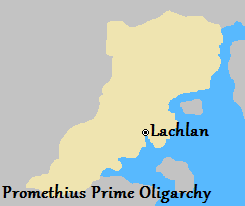Promethius prime
Promethius Prime Oligarchy | |
|---|---|
| Motto: "Civility Requires Certainty." | |
| Anthem: "The Parting Glass" [1] | |
 Map of Promethia. | |
| Capital and largest city | Lachlan |
| Official languages | Common |
| Demonym(s) | Promethian |
| Government | Noble Oligarchy |
• Patrician | Conall IV |
• Electors Temporal |
|
• Electors Spiritual |
|
| Independent (Sovereign) | |
• Archduchy of Promethia est. | 15th Ekaeda 1 PCE |
• Abolition of the Monarchy | 12th Tetreada 477 PCE |
• Patriciate est. | 21st Hendeceada 478 PCE |
| Area | |
• | 133,377 km2 (51,497 sq mi) |
| Population | |
• 899 PCE estimate | 3,500,000 |
• Density | 26.24/km2 (68.0/sq mi) |
| GDP (PPP) | estimate |
• Total | 2,625,000,000 Kyn |
• Per capita | 750 Kyn |
| GDP (nominal) | estimate |
• Total | S4,193,000,000 (899 PCE) |
• Per capita | S1,198 |
| Currency | Shilling (S) |
| Date format | dd.mm.yyyy |
The Promethius Prime Oligarchy, more commonly referred to as Promethia, is a sovereign unitary oligarchy, located in eastern Lashire. Promethia shares land borders with Vitaeroma to the west and Katapeshi to the north. The nation occupies a relatively flat coastal plain with a warm climate to the north, and a more temperate climate in the southern regions. The border with Vitaeroma runs along the line of the Duachta Hills while the border with Katapeshi runs along the edge of the Haltheston Hills. Promethia is an elective dictatorship with the Head of State and Government being elected for life by the Council of Electors, a largely aristocratic institution. The capital city is Lachlan, a coastal city of approximately 350,000 people found in the Lachlan Bay.
The Promethius Prime Oligarchy is ruled by a Patrician who serves as both Head of Government and Head of State. The Patrician is elected for life by the Council of Electors, which consists of the sitting Dukes of Lachlan, Montierey, and Halholen; the sitting Viscounts of Kilarne and Kirk, and the Barons of Landsey and Kirdaere; and the sitting Lord-Bishops of Lachlan, Haltness, and Furlangan. The Council of Electors is also responsible for proposing new laws and approving the more significant dictates of the Patrician. This system of government has existed since 477 PCE when the last Archduke of Promethia, Eoghan VII was deposed and executed. The composition of the Council consists of the descendants (or in the case of the Electors Spiritual, the incumbent title holders) of the original conspirators. Since the abolition of the monarchy titles of nobility and knighthoods have been conferred by the Patrician and by the Electors.
Promethia has a reasonably strong economy with a solid agrarian base. The majority of the nation's wealth is held by the ruling aristocracy, who are also the majority landowners. The growth of cottage industry and the abolition of serfdom and slavery during the abolition of the monarchy in 477 PCE has resulted in a growing free merchant class and the development of a monetary economy. The main exports of Promethia are textiles, cereals, temperate fruits and vegetables, and copper. The 572 PCE Exportation Act banned the export of iron, coal, and tin except by the government, and also nationalised these industries. Promethia also boasts a highly efficient system of taxation and duties, and has a heavily developed civil service which records births, deaths, and assets in a census which takes place every six years. The legal tender in Promethia is the silver Shilling (S), with bronze Decuars (1/10th of a Shilling), and copper Cenuars (1/100th of a Shilling) as denominational subunits, and the gold Crown (10 Shillings), and Drakes (100 Shillings) as denominations superunits.
Etymology & Terminology
History
Promethian Calendar
The Promethian calendar operates in the same way as the Xedan calendar, with the same number of days and months to a year and the same distribution of days between months. Where it differs is in the naming conventions for the days of the week and the months of the year, as well as the year numbering system. The current Era is referred to as the Promethian Common Era (PCE) and began retroactively in the year that the Archduchy of Promethia was formed, which became 1 PCE. The current years is 900 PCE.
The days of the week on the Promethian calendar are:
- Monday - Ceadla
- Tuesday - Darala
- Wednesday - Triula
- Thursday - Caethla
- Friday - Cuigla
- Saturday - Seula
- Sunday - Seachla
The months of the year on the Promethian calendar are:
- January - Ekaeda
- February - Deuteada
- March - Triadeada
- April - Tretreada
- May - Pentadeada
- June - Hexeada
- July - Hepteada
- August - Octoaeda
- September - Enateada
- October - Deceada
- November - Hendeceada
- December - Dodeceada
Politics
Council of Electors
- Lord Thomas, 3rd Duke Cantwell of Lachlan
- Lady Amelia, 8th Duchess Cathal of Montierey
- Lord Angus, 7th Duke Armstrong of Halhollen
- Lord Harold, 5th Viscount Anston of Kilarne
- Lady Gertrude, 4th Viscountess Trenerry of Kirk
- Sir Andrew, 19th Baron Cutting of Landsey
- Sir Michael, 5th Baron Bowman of Kirdaere
- Revered Canon Adrian Caldwell, Lord-Bishop of Lachlan
- Revered Canon Sir Anthony Falkner, Lord-Bishop of Haltness
- Revered Canoness Dame Celestine Kirkbride, Prince-Bishop of Furlangan

